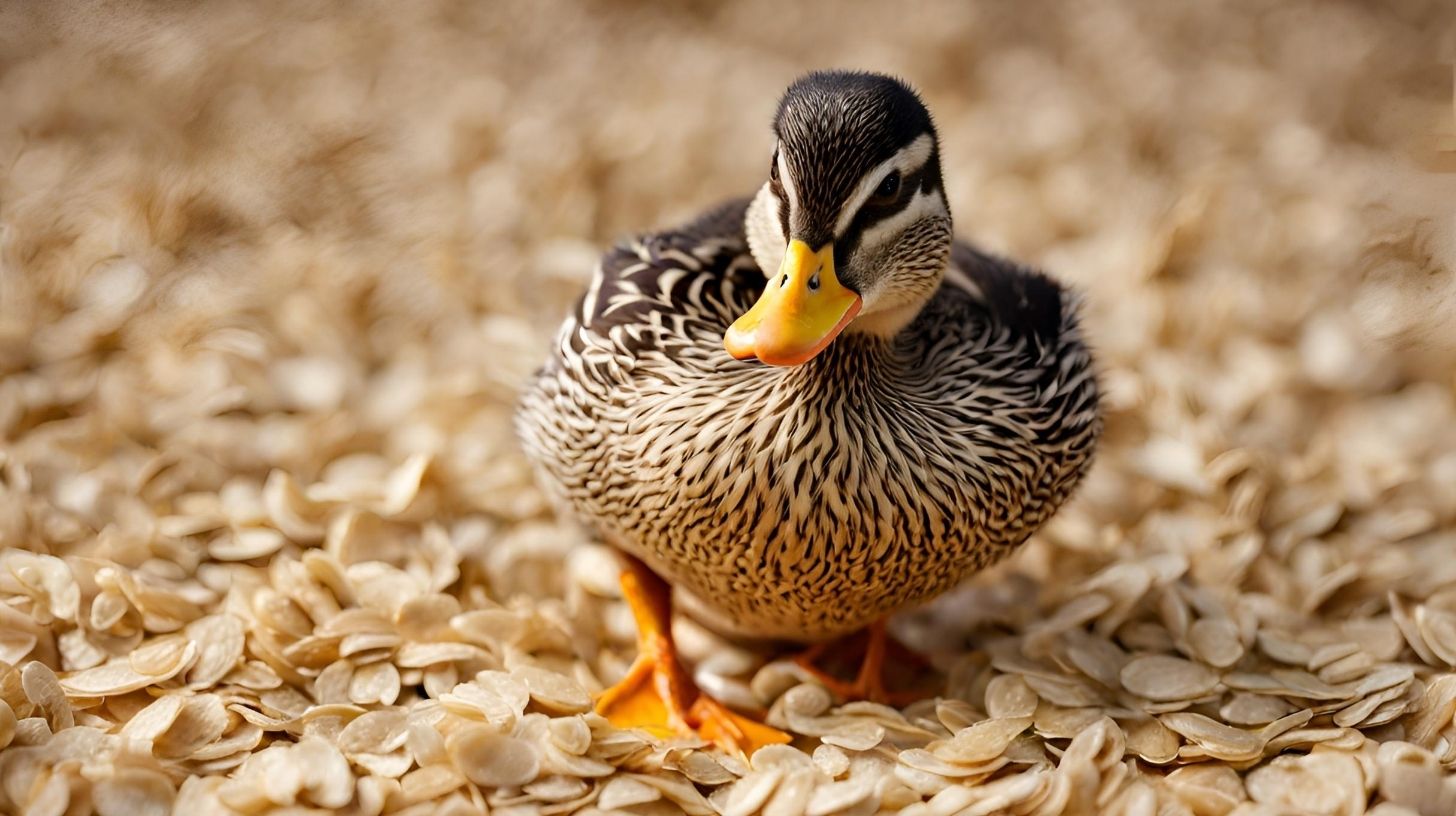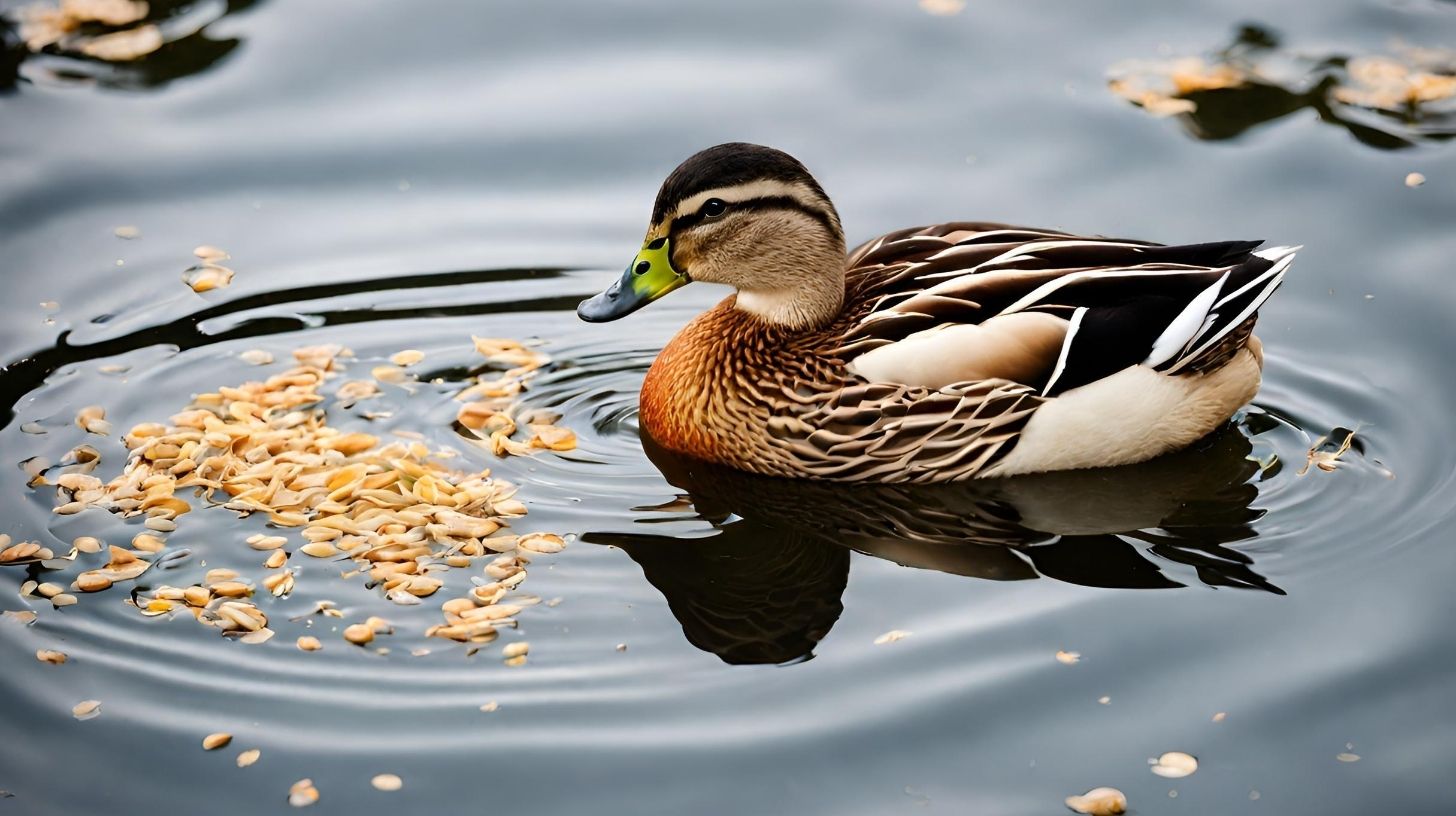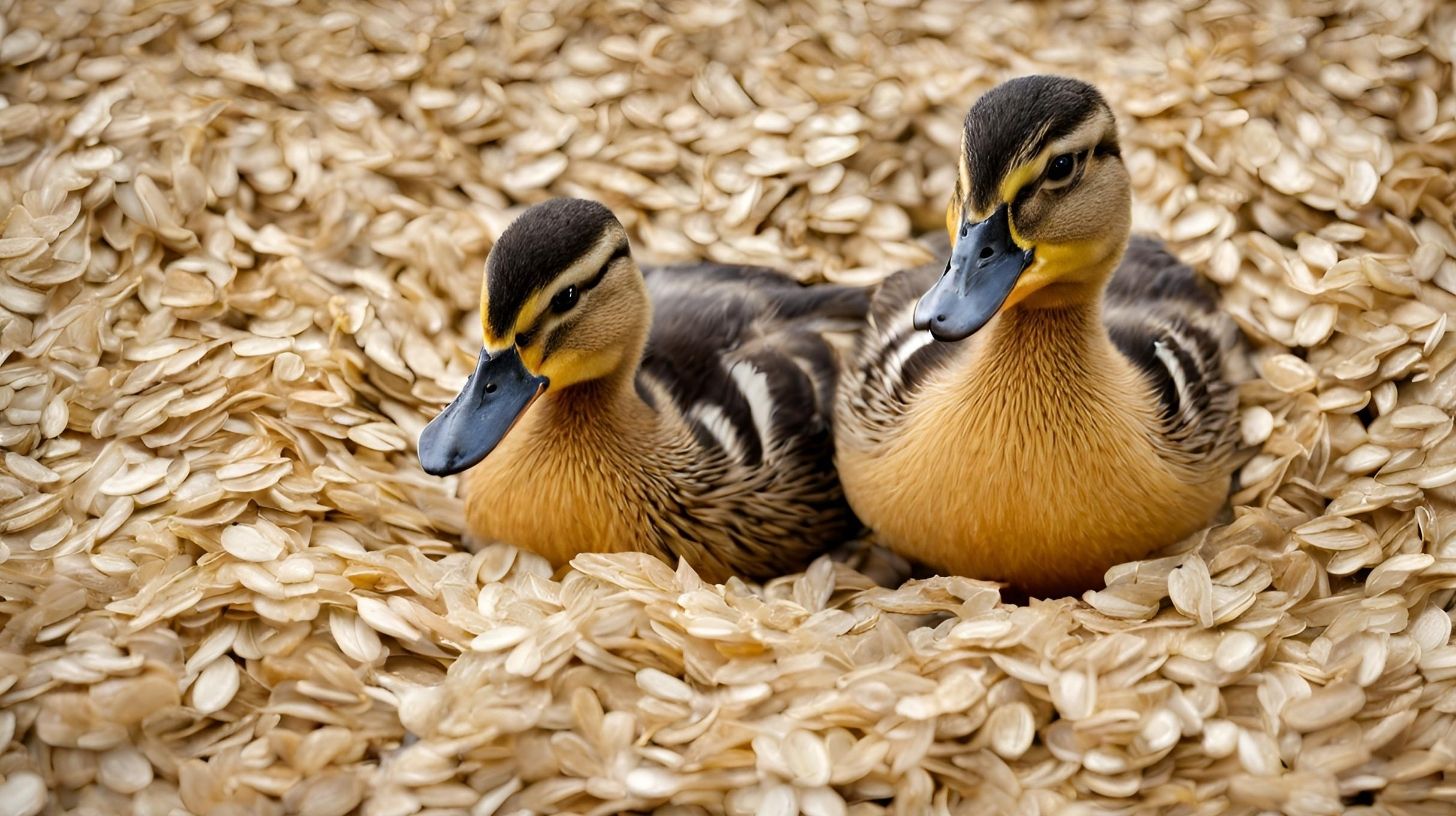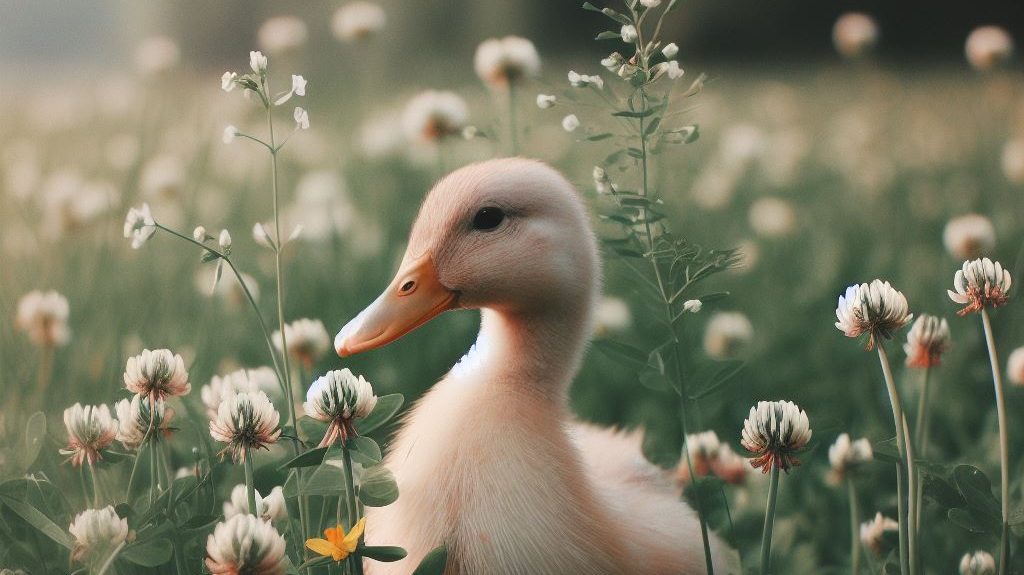Can Ducks Eat Rolled Oats? Benefits and Feeding Tips

Table of content:
- What Nutrients Do Oats Provide for Ducks?
- Are Oats Safe for Ducks to Eat?
- What Are the Benefits of Oats for Ducks?
- What Are the Risks of Feeding Ducks Oats?
- How Much Oats Should You Feed Ducks?
- What is the Best Way to Feed Ducks Oats?
- Signs of Illness or Allergies in Ducks after Eating Oats
- Are There Any Alternatives to Oats for Ducks?
- FAQs About Feeding Ducks Oats
- Conclusion
Rolled oats are a common cereal grain that many people eat for breakfast. But can you share your morning bowl of oatmeal with your feathered friends? Ducks can safely eat rolled oats in moderation as part of a balanced diet.
Key Takeaways:
- Rolled oats provide nutrients like carbohydrates, protein, and fiber for ducks.
- Only feed ducks raw, uncooked oats to avoid digestive issues.
- Oats should be just a supplementary treat, not a main diet item.
- Prevent salmonella contamination by storing oats properly.
- Watch for signs of allergic reactions when introducing new foods.
Oats make a nutritious supplemental treat for ducks when fed properly. Keep reading to learn about the health benefits of oats, how much to feed ducks, and the best way to offer rolled oats safely.
What Nutrients Do Oats Provide for Ducks?
Rolled oats can offer some key vitamins, minerals, and other beneficial nutrients for duck health:
- Carbohydrates for energy. Oats are high in complex carbs.
- Protein for muscle growth and egg production. Oats contain 12% protein.
- Fiber for digestion and gut health. Oats have 10% fiber.
- Thiamine for metabolism. Oats are high in vitamin B1.
- Iron for blood health. Oats provide iron for oxygen transport.
- Zinc and selenium for immunity and feather growth.
So in moderation, plain rolled oats can provide valuable nutrition to enhance a balanced duck diet. They are a savory, energy-packed treat.
 Are Oats Safe for Ducks to Eat?
Are Oats Safe for Ducks to Eat?
Plain rolled oats are duck-safe. But there are some important feeding guidelines to follow:
- Only feed raw, dry oats. Do not cook them or add any flavors.
- Prevent bacterial contamination and mold growth by storing oats in sealed containers in cool, dry areas. Clean feed dishes thoroughly.
- Start with small amounts and gradually increase over 2 weeks. Look for signs of allergies or intolerance.
- Feed oats as a supplemental treat no more than 2-3 times per week. Oats should never exceed 10% of total food volume.
- Always provide plenty of fresh water. Oats may cause a temporary increase in thirst. Monitor water intake.
- Adjust amounts for duckling, adolescent, and adult ducks based on age.
Feeding oats according to these tips will help ensure proper digestion and nutrient absorption. Oats offer more benefits than risks when used as directed.
What Are the Benefits of Oats for Ducks?
Used appropriately, rolled oats as duck treats can provide:
1. Needed Calories
The carbohydrates in oats deliver essential energy for active ducks. The grains provide fuel for swimming, running, flying, and keeping warm.
2. A Protein Boost
The protein in oats supports muscle growth, egg production, and other metabolic functions. Protein is particularly crucial for fast-growing ducklings.
3. Healthy Digestion
The fiber in oats encourages digestion and gut motility. The grain consistency also massages and cleans duck crops as it is swallowed.
4. Increased Foraging
Scatter feeding oats prompts important natural foraging behaviors. Ducks enjoy hunting through vegetation for tasty grains.
5. Essential Micronutrients
Oats contain small amounts of vitamins, minerals, and antioxidants needed for immunity, organ function, and overall wellness.
So a few oats deliver big nutritional benefits ducks love. Used properly, they make a safe, nutritious supplement.
What Are the Risks of Feeding Ducks Oats?
While oats offer many advantages, there are some potential drawbacks to be aware of:
- Choking hazard from improperly sized or shaped pieces for small ducklings.
- Salmonella and mold growth if old, wet, or unsealed oats are fed.
- Allergies or intolerance are possible, although less common in waterfowl.
- Nutritional imbalances if oats exceed 10% of total food volume.
- Angel wing deformities possible if excessive protein is fed before full feather growth.
Following proper feeding guidelines minimizes these risks. Most health issues stem from overfeeding, spoiled oats, or being introduced too quickly.
How Much Oats Should You Feed Ducks?
Oats should be limited to a supplemental treat comprising no more than 10% of total food volume. Here are suggested serving sizes:
- Ducklings: 1-2 teaspoons per duckling a few times weekly.
- Adolescents: 1-2 tablespoons per duck a couple times a week.
- Adults: 1/4-1/2 cup per duck 2-3 times weekly.
Always adjust amounts based on duck activity level, body condition, and diet. Very active ducks or underweight birds may tolerate more oats. Overweight or sedentary ducks likely need less.
Monitor duck health and watch for signs of excess weight gain, loose droppings, or other intolerance indicators. Discontinue oats if any issues appear.
Scatter feeding small amounts encourages natural foraging behaviors. But prevent competition and bullying at feedings to ensure all ducks get some.
What is the Best Way to Feed Ducks Oats?
Follow these tips for safely feeding oats:
- Select quality rolled oats free from dirt, bugs, or moisture. Avoid quick oats or instant flavored packets.
- Store sealed oats in cool, dry areas to prevent mold or bacteria growth. Discard any old, discolored, or foul-smelling oats.
- Scatter oats in shallow water or forage areas to encourage natural feeding behaviors. Avoid piled servings.
- Offer oats separate from other feedings for easier portion control and consumption monitoring.
- Introduce slowly over 2 weeks, starting with 1-2 teaspoons per duckling and increasing gradually.
- Rinse food and water containers thoroughly before and after use to prevent illness.
- Adjust amounts and frequency based on duck age, body condition, and overall diet.
Following these proper feeding practices will maximize benefits while minimizing any risks.
 Signs of Illness or Allergies in Ducks after Eating Oats
Signs of Illness or Allergies in Ducks after Eating Oats
Most ducks tolerate plain oats very well. But some may show adverse signs including:
- Listlessness, lethargy, or weakness
- Decreased appetite or interest in food
- Increased water consumption
- Weight loss
- Loose droppings or diarrhea
- Angel wing posturing in young ducks
- Feather damage or loss
- Hives, swelling, or irritated skin
Discontinue oats immediately if any concerning symptoms appear after eating. Seek veterinary advice if symptoms persist or seem severe.
Allergy prevalence is low in ducks but possible. Introduce new treats slowly and watch closely for reactions.
Are There Any Alternatives to Oats for Ducks?
While oats provide excellent nutrition, other healthy treats can further vary the diet. Some alternatives to consider include:
- Cooked rice or wild rice – Contains less protein than oats
- Dried corn – High carbohydrate energy source
- Milo or sorghum seeds – Gluten-free grain option
- Wheat berries – Contains more vitamin E than oats
- Barley – High in manganese and selenium
- Chopped greens or vegetation – Provides fiber and phytonutrients
A diverse diet with adequate nutrition is key for optimal duck health and condition. Adding a few different grains, seeds, or greens provides variety.
FAQs About Feeding Ducks Oats
Can I feed ducks instant oats or flavored oat packets?
No, stick to plain rolled oats with no added sugar, salt, or other flavorings. The extra ingredients can cause health issues.
What about oatmeal or cooked oat recipes?
Raw oats are the safest. Avoid feeding ducks cooked oatmeal, baked goods with oats, granola mixes, etc. The texture and added ingredients may be problematic.
Is it okay to feed wild ducks oats?
Feeding wild ducks can lead to overreliance, disease transmission, and environmental pollution. It is illegal in some areas. Only offer oats to controlled domesticated ducks.
Can ducklings eat oats safely?
Yes, in tiny portions. Gradually introduce 1-2 teaspoons of oats to ducklings over 2 weeks. Never allow choking hazards from improperly sized oats.
Can oats impact angel wing development?
Overfeeding protein before full feather growth may contribute to angel wings. Keep oat amounts moderate and avoid excess protein for ducklings under 6-8 weeks old.
Conclusion
Rolled oats make a nutritious supplemental treat for ducks when used properly. They provide energy, protein, fiber, and several vitamins and minerals. Feed oats in moderation 2-3 times per week and adjust amounts based on duck age and condition.
Store and serve oats safely to avoid illness. Discontinue use if any concerning symptoms develop. Overall, plain oats can offer ducks many benefits for digestion, feathering, and general health. Just be sure to feed them as directed along with a balanced main diet.
Welcome. I’m Adreena Shanum, the proud owner of this website, and I am incredibly passionate about animals, especially poultry. I founded adreenapets.com as a labor of love, stemming from my desire to share my knowledge and experiences with poultry enthusiasts worldwide.




